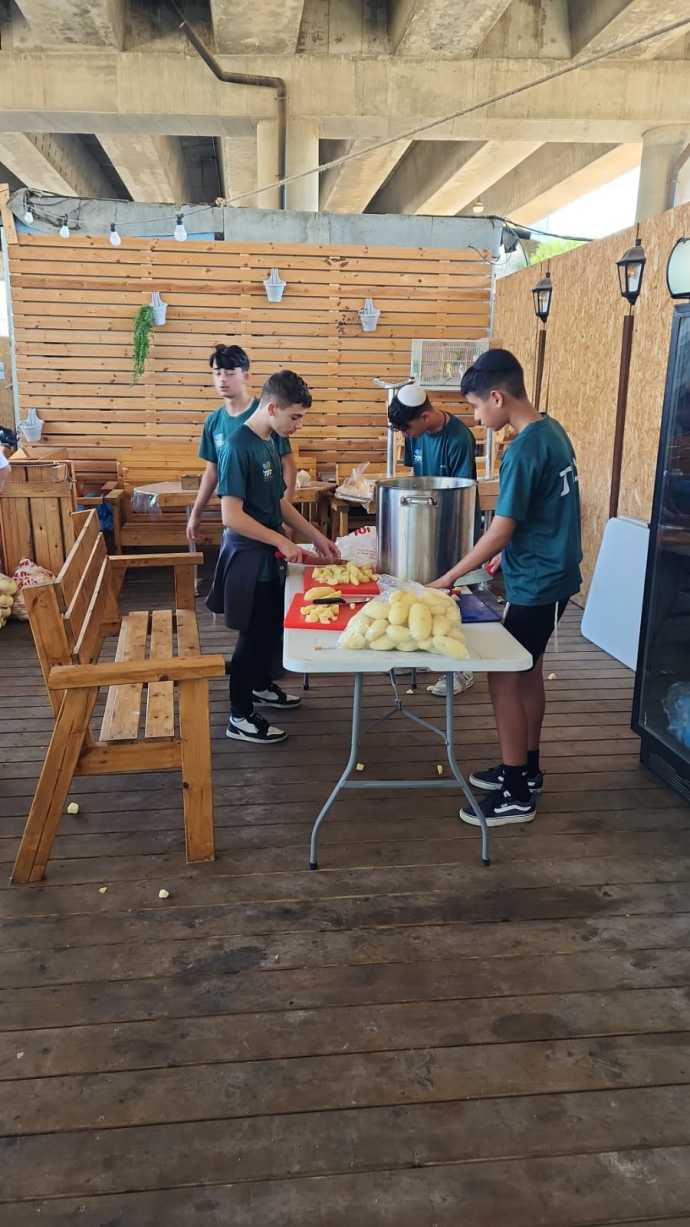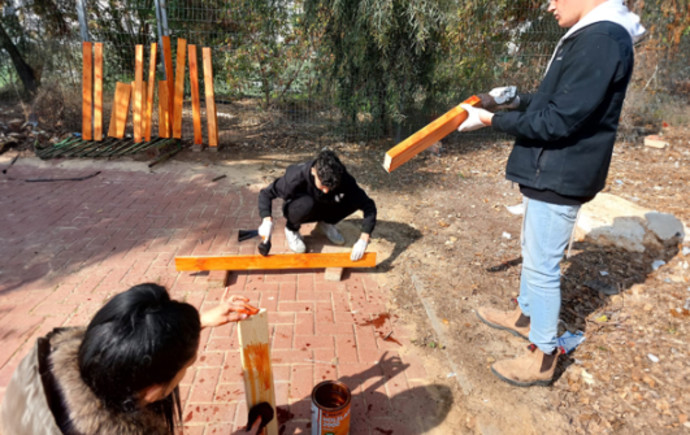Since the beginning of the Israel-Hamas war, the number of at-risk youth in Israel has increased, according to Shimon Abuchatzeira, the head of the Keren Kayemeth LeIsrael-Jewish National Fund (KKL-JNF)’s Department for At-Risk Youth. For KKL-JNF, assisting them has been one of the priorities of the organization’s multiple endeavors to support Israelis in need.
Established in 2021, the Department for At-Risk Youth has utilized the organization’s vast experience in education and the land of Israel to create positive frameworks for teens who have dropped out of school, placing them in fields such as agriculture, carpentry, and bicycle riding instruction, and helping them regain their self-confidence, act responsibly, and ultimately reconnect with society. KKL-JNF is currently operating programs for at-risk youth in thirty-four municipalities in Israel.
Abuchatzeira explains that the department was created in the wake of the coronavirus pandemic, when many schools were closed, or classes were conducted remotely. As a result of the physical disconnect, the high school dropout rate rapidly increased.

The outbreak of the war on October 7, he adds, led to increased numbers of students leaving their high school studies. Teens have dropped out during the war due to a number of reasons. Some found that the pressures and traumas of the war made studying difficult, if not impossible. Many students have lost family members in the fighting. A significant number of students were evacuated from their homes in Israel’s southern and northern areas, were sent to hotels with their families, and found themselves bereft of an academic and social framework in unfamiliar locations. Some began to drink alcohol and take drugs.
Since October 7, KKL-JNF has been working with youth who have been evacuated and are staying in hotels in Jerusalem and Tiberias, in addition to the many whom the organization had been assisting before the war started.

KKL-JNF established a program for teens in locations such as Shlomi, Merom Galil, Zefat, Jerusalem, Bnei Brak, and Bet Shemesh, among others, that teaches carpentry. Students learn to build tables, swings, benches, and other items. The finished products are sold or donated to individuals and organizations.
In some cases, Abuchatzeira adds, the teens have created special rest areas with swings and benches in memory of fallen soldiers or dedicated these structures to the return of the hostages from Gaza.
“The purpose of these activities is to give them something significant to do, to rejoin society – either within an educational framework, with IDF service, or through national service (Sherut Leumi) – to take them from a situation of disconnect to one of doing,” he says. “When a teen builds a memorial corner for a soldier who was killed, they understand what the soldier did for the country and their contribution to the country.”
According to Abuchatzeira, many teens in the KKL-JNF program for at-risk youth traveled to Israel’s northern border and the Gaza border to assist soldiers, bringing and preparing food and supplies for them. Bringing supplies to the soldiers, he says, connected them to the society around them, and to values such as giving and mutual responsibility.
Since the beginning of the war, the youth assisted by KKL-JNF has distributed some 30,000 hot meals to soldiers. In addition, many teens have been visiting those wounded in the fighting and helping them with several activities.
“We are talking about teenagers who were going through difficult experiences before we connected with them, but everyone has been very eager to volunteer in these difficult times,” says Abuchatzeira.
Another significant way KKL-JNF helps equip at-risk teens who have dropped out is by training them to teach cycling to children. KKL-JNF takes the teens to the Wingate Institute to learn how to teach bicycling, after which they are sent to schools and youth groups to teach bike riding skills.
“The idea is to turn the teen from a survivor into a leader. Helping others, doing, and taking responsibility gives them the tools for a successful life,” says Abuchatzeira.
He tells of R., a girl from northern Israel who had dropped out of high school at age 16 because of the pandemic. She took the bicycle training course, studied carpentry, and began to work.
Several months later, she returned to school on a part-time basis. As a result of the KKL-JNF programs for at-risk youth, she spent her time doing constructive activities and eventually joined Israel’s National Service program (Sherut Leumi).
Another teen, Y., a Haredi teen from Bnei Brak, had also dropped out of high school. He spent a year in KKL-JNF’s programs, learning skills and working, and eventually joined the IDF, where he is currently in training.
Summing up the KKL-JNF program for at-risk youth, Abuchatzeira says, “We want to give them the self-confidence so they can take their lives seriously. We don’t want to leave them in the weak position they are now.”
Many vital projects have been made possible thanks to the support of KKL-JNF friends worldwide. To donate to KKL-JNF and support the activities for at-risk youth and many other initiatives to help Israelis in need and soldiers, click here.
This article was written in cooperation with KKL-JNF.
